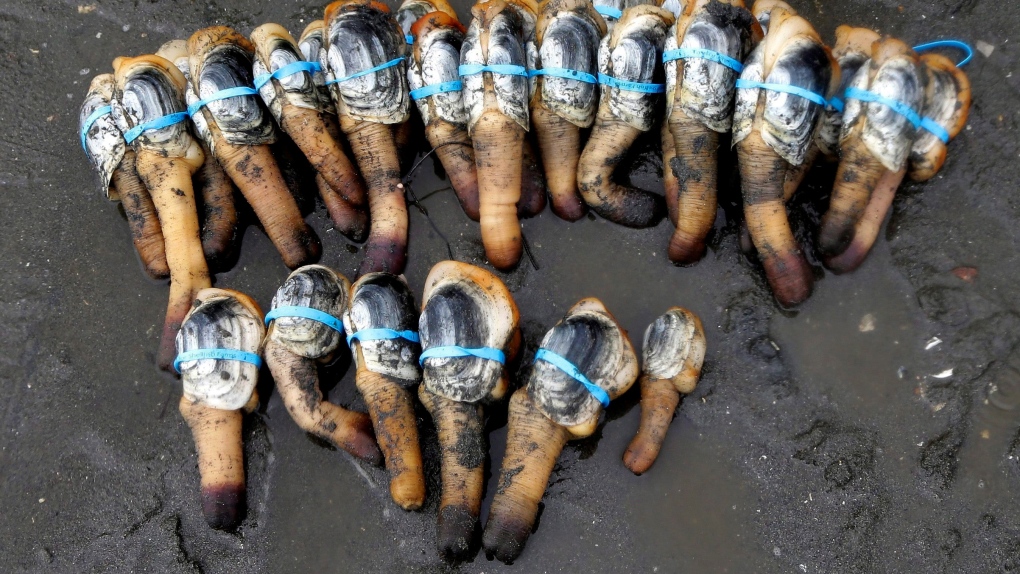Potential cash crop? Vancouver Island researchers involved in geoduck aquaculture
 Desiree Lawson, MaPP Implementation Coordinator, Central Coast Indigenous Resource Alliance, with a geoduck. (Desiree Lawson)
Desiree Lawson, MaPP Implementation Coordinator, Central Coast Indigenous Resource Alliance, with a geoduck. (Desiree Lawson)
Researchers from Vancouver Island and several coastal B.C. First Nations are looking at ways to grow and potentially harvest Pacific geoduck for export as a food product.
Geoduck, pronounced gooey-duck, are a member of the clam species and are "highly valued seafood in Asian markets," according to a release by North Island College (NIC) in Courtenay, B.C.
The college has partnered with the Central Coast Commercial Fisheries Association (CCCFA) on a three-year project to examine the potential production of geoduck.
The CCCFA is a commercial fisheries business that's operated by the Heiltsuk, Kitasoo Xai’xais, Nuxalk and Wuikinuxv First Nations, which are located on B.C.'s Central Coast, north of Vancouver Island.
The hope is that the project will help both researchers and surrounding communities alike.
"The training and results from this research will have a meaningful impact on the communities and will provide rich applied learning experiences for NIC students," said Naomi Tabata, manager of the Centre for Applied Research, Technology and Innovation at NIC.
 In this March 23, 2015 photo, geoducks grown for for Taylor Shellfish Farms are shown with blue bands around them and ready for transport to a packaging facility near Harstine Island, Wash. (AP / Ted S. Warren)
In this March 23, 2015 photo, geoducks grown for for Taylor Shellfish Farms are shown with blue bands around them and ready for transport to a packaging facility near Harstine Island, Wash. (AP / Ted S. Warren)
The first year of the project will focus on the physical layout of the test sites where geoduck will be grown, as well as ocean conditions during this time.
The test sites for the project will be located within Heiltsuk and Kitasoo Xai’xais Nations’ traditional territories, off the central coast of the B.C. mainland.
The next two years will be focusing on how the juvenile geoducks grow and survive under these conditions.
The CCCFA says it's interested in the "feasibility of geoduck aquaculture" for both its educational purposes and potential economic opportunity.
Other groups involved in the three-year research project include Fisheries and Oceans Canada, the Central Coast Indigenous Resource Alliance and the Marine Plan Partnership for the North Pacific Coast.
AQUACULTURE INDUSTRY ON THE RISE
Other Vancouver Island communities are also looking towards the ocean to break into different aquaculture markets.
In Sidney, B.C., the Tsawout First Nation issued a licence to Cascadia Seaweed to open a commercial seaweed farm on the nation's traditional waters, with the goal of producing dozens of tonnes of seaweed.
On the other coast of the island, in Tofino, B.C., a local duo is producing organic kelp products with eyes towards expanding.
CTVNews.ca Top Stories

BREAKING Emergency crews responding to avalanche in Whistler, B.C., area
Paramedics and search crews have been dispatched to the scene of an avalanche that struck Monday in the Whistler, B.C., area.
Quebec fugitive killed in Mexican resort town, RCMP say
RCMP are confirming that a fugitive, Mathieu Belanger, wanted by Quebec provincial police has died in Mexico, in what local media are calling a murder.
Bill Clinton hospitalized with a fever but in good spirits, spokesperson says
Former President Bill Clinton was admitted Monday to Georgetown University Medical Center in Washington after developing a fever.
Trump again calls to buy Greenland after eyeing Canada and the Panama Canal
First it was Canada, then the Panama Canal. Now, Donald Trump again wants Greenland. The president-elect is renewing unsuccessful calls he made during his first term for the U.S. to buy Greenland from Denmark, adding to the list of allied countries with which he's picking fights even before taking office.
Pioneering Métis human rights advocate Muriel Stanley Venne dies at 87
Muriel Stanley Venne, a trail-blazing Métis woman known for her Indigenous rights advocacy, has died at 87.
King Charles ends royal warrants for Ben & Jerry's owner Unilever and Cadbury chocolatiers
King Charles III has ended royal warrants for Cadbury and Unilever, which owns brands including Marmite and Ben & Jerry’s, in a blow to the household names.
Man faces murder charges in death of woman who was lit on fire in New York City subway
A man is facing murder charges in New York City for allegedly setting a woman on fire inside a subway train and then watching her die after she was engulfed in flames, police said Monday.
Canada regulator sues Rogers for alleged misleading claims about data offering
Canada's antitrust regulator said on Monday it was suing Rogers Communications Inc, for allegedly misleading consumers about offering unlimited data under some phone plans.
Multiple OnlyFans accounts featured suspected child sex abuse, investigator reports
An experienced child exploitation investigator told Reuters he reported 26 accounts on the popular adults-only website OnlyFans to authorities, saying they appeared to contain sexual content featuring underage teen girls.
































